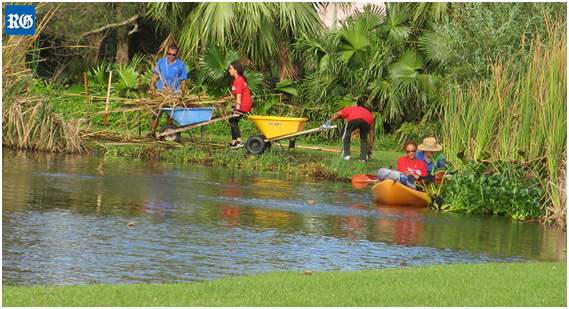Recent News
Bermuda’s coral reefs ‘doing well’ but future is uncertainTuesday, August 10, 2021
Bermuda’s coral reefs could help to protect the island from strengthening storms – if we are able to keep them healthy.
BZS: Kids On The Reef Programme
Wednesday, August 04, 2021
The Bermuda Zoological Society [BZS] recently completed the ninth year of the Kids on the Reef spring programme, “an immersion programme teaching children the significance of marine conservation and the skills of free-diving.
No vaccinations for BAMZ animals, yet
Tuesday, August 03, 2021
The residents of the Bermuda Aquarium Museum and Zoo have not received Covid-19 vaccinations, but that could change as research continues.
Mangrove forest project gets boost from Aspen donation
Tuesday, July 13, 2021
An environmental drive to create a coastal red mangrove forest on Trunk Island has been boosted by a $125,000 donation from Aspen Bermuda.
Support Creation Of Coastal Mangrove Forest
Tuesday, July 13, 2021
The Bermuda Zoological Society [BZS] has received a donation from Aspen Bermuda Limited to support the creation of a “Coastal Red Mangrove Forest” on Trunk Island.
About
GovernanceAbout Us
Newsletter
Latest News
Gift & Bookstore
Contact
General Inquiries
info@bzs.bm
Latest News
All the latest updates and news from the Bermuda Aquarium, Museum, and Zoo, one of Bermuda's leading visitor attractions!
Jonathan Bell
Published Jan 16, 2018 at 8:00 am (Updated Jan 16, 2018 at 6:41 am)

HSBC volunteers help a Bermuda Zoological society team clean up
Cloverdale Pond in Smith's (Photograph supplied)
Two ponds have been cleaned up courtesy of an island conservation programme.
Cloverdale Pond in Smith’s and Southampton’s Evan’s Pond, a refuge for endangered species, were improved through the Bermuda Zoological Society’s wetlands remediation programme.
The scheme, which became the HSBC global water programme for Bermuda in 2014, was designed to remove toxic petroleum compounds from ponds.
The build-up of the poisonous hydrocarbons is a threat to the island’s two endemic killifish species, as well as native diamondback terrapins, which are a protected species.
The compounds, which come from oil, water runoff and vehicle exhausts, can be broken down by bacteria when the pond sediments are aerated.
The two-year grant from HSBC allowed the proposal to be tested in the field.
Volunteers also took part, with help from the Department of Environment and Natural Resources.
The BZS said Cloverdale was chosen first because of its small size, its “known severe effects on wildlife” and the absence of protected species in the water.
Evan’s Pond was selected as the second test site because of its small population of killifish.
The ponds were divided into sections and aerated for six to eight hours a day with solar powered compressors.
Hydrocarbon levels saw a major reduction over the course of a year.
The next site for remediation is the South Pond at the Mid Ocean golf course, where the hatching of diamondback terrapins has been hampered by pollution.


